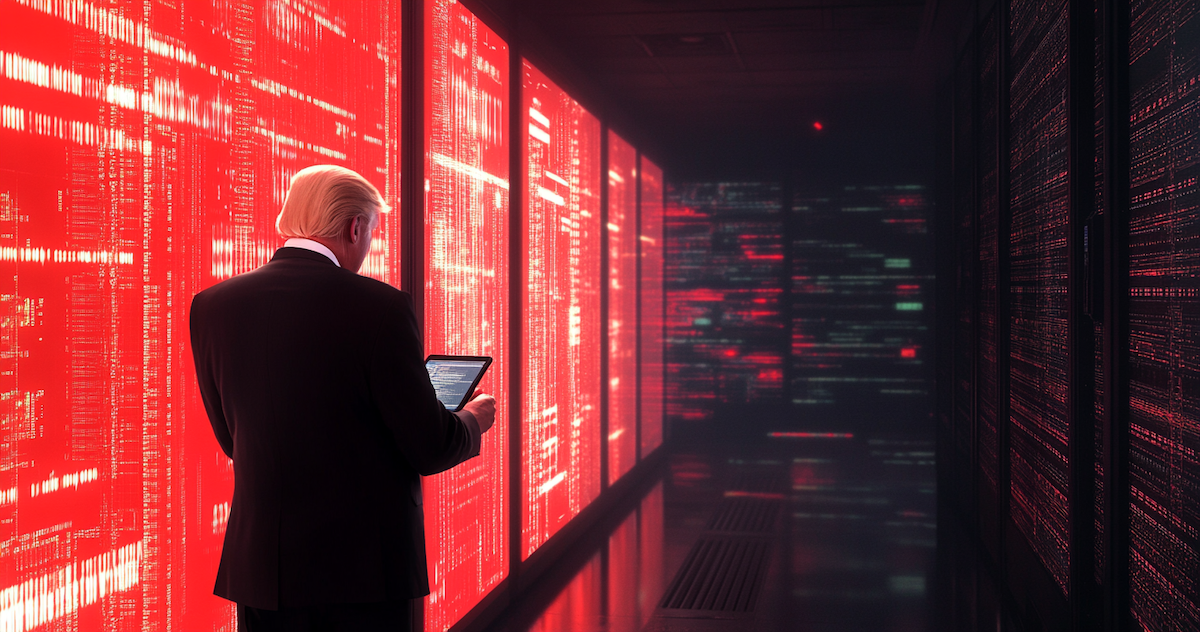Artificial intelligence is bound to have a big year again in 2025. Not only do we expect the technology to improve, and for companies to release new and innovative applications, but we also expect that government policymakers and regulators will not want to be left behind without a say.
As the political landscape changes, these are the top trends that AI experts are watching this year:
1. New administration, new rules
The incoming administration under Donald Trump is expected to take a more hands-off approach to AI regulation than Joe Biden did. Xiaomeng Lu, director of geo-technology at Eurasia Group, said she expects Trump to “care less” about AI. “Exactly how much less will depend on the power dynamics among President Trump and his newly appointed AI advisors,” she says.
While nominated White House AI Czar David Sacks and AI Policy Advisor Sriram Krishnan are more focused on “promoting and facilitating AI innovation” than preventing specific harms of the technology, White House Office of Science and Technology Policy Director Michael Kratsios and Deputy Lynne Parker (a former Biden official) are much more “balanced” in their approach, Lu notes.
Mina Narayanan, a research analyst at Georgetown's Center for Security and Emerging Technology, expects that while Trump is lighter-touch in AI regulation than Biden was, she doesn’t think there will be a major shift. “In particular, I believe the incoming administration will continue to prioritize promoting AI safety, strengthening the domestic AI ecosystem, and maintaining global leadership on AI,” she said.
2. An autonomous vehicle breakthrough?
Another policy focus could center on autonomous vehicles.
“New studies have shown clear evidence of massive reductions in both bodily harm and property damage through the expanded use of AVs,” said Matt Mittelsteadt, a research center at George Mason University’s Mercatus Center, a libertarian think tank. He thinks that industry advancements — such as the expansion of Google’s Waymo, a fully autonomous robotaxi service, into new markets — underscores the need for policies that are less “human-centric” and more amenable to driverless vehicles.
With Tesla CEO Elon Musk playing a major advisory role in Trump’s administration, Mittelsteadt’s hopes may well become reality.
3. Military and national security acceleration
The Pentagon will only tighten its embrace of AI in 2025. Jeremy Goldman, EMARKETER’s senior director of marketing, commerce and tech briefings, predicts “heavier investment in autonomous systems, AI-driven intelligence analysis, and next-gen cyber warfare tools.” But, he warns, “with greater use comes greater scrutiny; watchdog groups will ramp up pressure to prevent AI mission creep and unintended escalation risks.”
Joel Predd, senior engineer and co-director of the RAND Geopolitics of AGI Initiative, raised two crucial questions about AI. First, he’s watching to see whether AI will become a top priority in national security strategy. “More often than not, AI features today as a component of technology competition within a broader strategic competition with China,” he said. “The question is whether AI will emerge in 2025 as a top-most, transcendent national security issue given transformative progress in frontier models.”
Further, he told GZERO that he’s keeping a close eye on whether AI is implicated in any major national security or economic crisis, such as AI leading to increased unemployment or a non-state actor using AI to launch an advanced cyberattack. “When the NSC convenes to discuss the next crisis, will AI feature prominently in diagnosing the problem … or a solution?”
4. US-China competition intensifies
In 2025, tensions between the US and China will only intensify. “The US-China AI chip cold war isn’t cooling anytime soon,” Goldman said, noting that the Trump administration is likely to “double down on export controls” that began in earnest under Biden.
Goldman anticipates “retaliatory economic measures from Beijing, but also creative backdoor efforts by Chinese firms to sidestep restrictions through third-party partnerships.” The escalating tensions come as both nations vie for AI supremacy. The winner will have a strategic advantage not only technologically but also economically and militarily.
5. Silicon Valley gets cozy with Washington again
Silicon Valley giants are increasingly primed to play an influential role in the Trump administration. Not only is Trump staffing up with players like Musk, Sacks, and other tech mainstays, but he’s also receiving generous donations from tech companies and leaders. Amazon, Meta, Uber, Robinhood, and Perplexity, along with OpenAI founder Sam Altman (a Democratic donor), each pledged $1 million or more for Trump’s inauguration.
That could signal an increased friendliness toward tech, but even in Silicon Valley’s right-wing circles not all is easily agreed upon. “High-skilled immigration, and in particular H-1B visas, has emerged as a divisive issue,” Narayanan said. “Recently, President-elect Trump endorsed H-1B visas, which allow US employers to hire foreign workers in specialty occupations. This stance ignited pushback from Trump allies who criticize H-1B visas as taking jobs from US-born workers. Will the incoming administration continue supporting H-1B visas or adopt different mechanisms to strengthen the AI workforce in the US?”
The year ahead
It’s impossible to predict what lies ahead for 2025, but one thing is clear: AI’s influence on policy, national security, and everyday life will only grow more profound as the technology continues to evolve rapidly and assert itself into our work, education, and social life.
